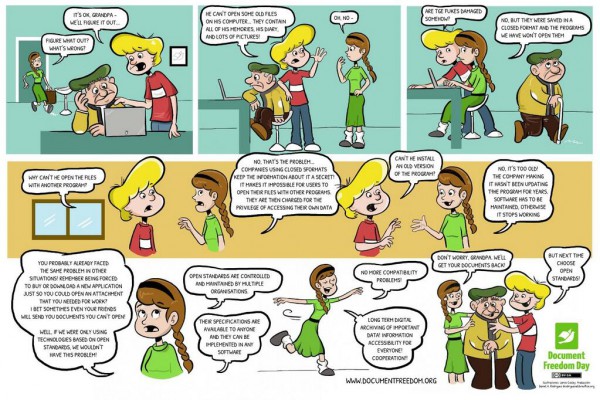ODF recommended for Galicia’s public sector
 Joinup, the EU’s public sector open source news website, reports that the government of Spain’s autonomous region of Galicia is recommending that the region’s public sector organisations adopt Open Document Format (ODF, ISO 26300) for editable electronic documents and PDF for non-editable electronic documents.
Joinup, the EU’s public sector open source news website, reports that the government of Spain’s autonomous region of Galicia is recommending that the region’s public sector organisations adopt Open Document Format (ODF, ISO 26300) for editable electronic documents and PDF for non-editable electronic documents.
“This will facilitate the re-use of documents and the creation of derivative works”, the government writes in a guide which was published on 26 March, Document Freedom Day (posts passim). Public sector bodies are also being advised to make their documents available using a copyleft licence, such as Creative Commons’ CC-by-SA.
The guide ‘Boas prácticas para a liberación de publicacións da Xunta de Galicia‘ (Good Practice Guide for liberating Galicia government documents) has been written by Galicia’s free software resource centre, the ‘Oficina de Coordinación de Software Libre’ (Ocfloss). The report is available in both ODT and PDF formats is also published under the CC-by-SA licence.
The guide also contains advice for the public sector on how to manage intellectual property rights in respect of its documents, images and multimedia files, as well as guidance on the creation of derivative works.
 As announced in September 2013, the OSB Alliance’s Office Interoperability Working Group has held a requirements engineering workshop in Stuttgart. OSB Alliance members Munich city council, Leipzig city council, Jena city council, the Swiss Federal Court, and the Swiss Federal IT Steering Unit FITSU defined commonly required improvements for the open source LibreOffice and OpenOffice suites. Other public authorities will providing supporting funding.
As announced in September 2013, the OSB Alliance’s Office Interoperability Working Group has held a requirements engineering workshop in Stuttgart. OSB Alliance members Munich city council, Leipzig city council, Jena city council, the Swiss Federal Court, and the Swiss Federal IT Steering Unit FITSU defined commonly required improvements for the open source LibreOffice and OpenOffice suites. Other public authorities will providing supporting funding. Today is
Today is 

